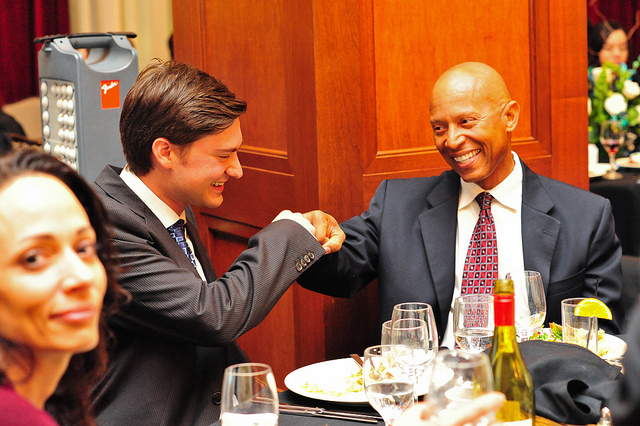
Greeting people with fist bumping is healthier than shaking hands or high-fives, latest research shows.
Researchers from the Aberystwyth University in the UK found that fist bumping transmitted fewer germs than the other two methods.
To prove this, researchers Dr Dave Whitworth and Sara Mela, dipped their sterile rubber gloves into an E. coli broth. They measured the amount of bacteria transmitted through different types of greetings like shaking hands, high-fives or fist bumping.
Handshaking passed the highest amount of germs. Fist-bumping and high-fives were associated with 90 percent and 50 percent lower rate of bacteria transmission than handshaking.
A stronger handshake that lasted long was involved with greater exposure to bacteria.
The reduced skin contact and high speed involved in fist bumping may be making it more hygienic than the other two, researchers said
Researchers expected that their findings will help establish a cleaner environment at workplaces.
"Adoption of the fist bump as a greeting could substantially reduce the transmission of infectious diseases between individuals," corresponding author Dr David Whitworth, said in a news release. "It is unlikely that a no-contact greeting could supplant the handshake; however, for the sake of improving public health, we encourage further adoption of the fist bump as a simple, free, and more hygienic alternative to the handshake."
The study has been published in the American Journal of Infection Control.
The findings come at a time when the use of handshaking at hospitals has become a topic of discussion. A study appeared in the Journal of the American Medical Association (JAMA) on 25 July discussed about eliminating handshakes from hospitals.
There also exists enough evidence to show that 80 percent of individuals carry disease- causing bacteria even after washing their hands. A study published in the Journal of Hospital Infection last August recommended replacing handshakes with a fist bump in hospitals to avoid bacterial transmission. Researchers found that fist bump facilitated this by "reducing contact time and total surface area exposed."
"The one thing about fist-bumping is that it's not the usable surface of your hand. If you shake someone's hand, you then eat with that part of the hand. Fist-bumping protects that usable surface," one of the study authors, W. Thomas McClellan, a plastic and hand surgeon in Morgantown, West Virginia, told National Geographic in December 2013.
Similarly, a statement released by Centers for Disease Control and Prevention (CDC) in the US warns against skin-to-skin contact as short as handshakes, with a person who has crusted scabies. According to experts, a handshake is enough to make the other person eligible for receiving scabies treatment.

















